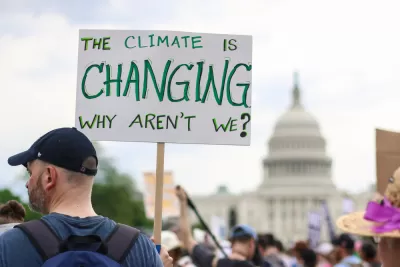A new U.N. report urges cities to upgrade their infrastructure to bolster climate resilience and build more sustainable, climate-friendly places.

In a piece on Wired, Matt Simon highlights the role of cities in the fight against climate change as laid out in a recent U.N. Intergovernmental Panel on Climate Change report.
The report presents opportunities along with challenges, notes coauthor William Solecki, of the City University of New York’s Hunter College, adding, "We recognize the world is very rapidly urbanizing—up to 70 percent of the world's population by 2050 will live in cities."
While urban agglomerations can lead to more deadly disasters that affect more people at once, "the good news is that cities could be designed so much better than they are now." In fact, "There's really opportunities to upgrade our infrastructure in a way that both addresses long-standing inequities and also invests in climate resilience," according to Rachel Cleetus, policy director of the Climate and Energy Program at the Union of Concerned Scientists and a report coauthor.
As Simon notes, the report recommends what it calls 'climate resilient development,' a set of processes that "link scientific, Indigenous, local, practitioner and other forms of knowledge" and "are more effective and sustainable because they are locally appropriate and lead to more legitimate, relevant and effective actions."
The report highlights the importance of local buy-in and combining strategies that adapt cities to the inevitable effects of climate change with policies that reduce emissions to slow future damage and protect vulnerable communities.
FULL STORY: Cities Are Unlikely Yet Powerful Weapons to Fight Climate Change

Planetizen Federal Action Tracker
A weekly monitor of how Trump’s orders and actions are impacting planners and planning in America.

Maui's Vacation Rental Debate Turns Ugly
Verbal attacks, misinformation campaigns and fistfights plague a high-stakes debate to convert thousands of vacation rentals into long-term housing.

Restaurant Patios Were a Pandemic Win — Why Were They so Hard to Keep?
Social distancing requirements and changes in travel patterns prompted cities to pilot new uses for street and sidewalk space. Then it got complicated.

In California Battle of Housing vs. Environment, Housing Just Won
A new state law significantly limits the power of CEQA, an environmental review law that served as a powerful tool for blocking new development.

Boulder Eliminates Parking Minimums Citywide
Officials estimate the cost of building a single underground parking space at up to $100,000.

Orange County, Florida Adopts Largest US “Sprawl Repair” Code
The ‘Orange Code’ seeks to rectify decades of sprawl-inducing, car-oriented development.
Urban Design for Planners 1: Software Tools
This six-course series explores essential urban design concepts using open source software and equips planners with the tools they need to participate fully in the urban design process.
Planning for Universal Design
Learn the tools for implementing Universal Design in planning regulations.
Heyer Gruel & Associates PA
JM Goldson LLC
Custer County Colorado
City of Camden Redevelopment Agency
City of Astoria
Transportation Research & Education Center (TREC) at Portland State University
Jefferson Parish Government
Camden Redevelopment Agency
City of Claremont





























